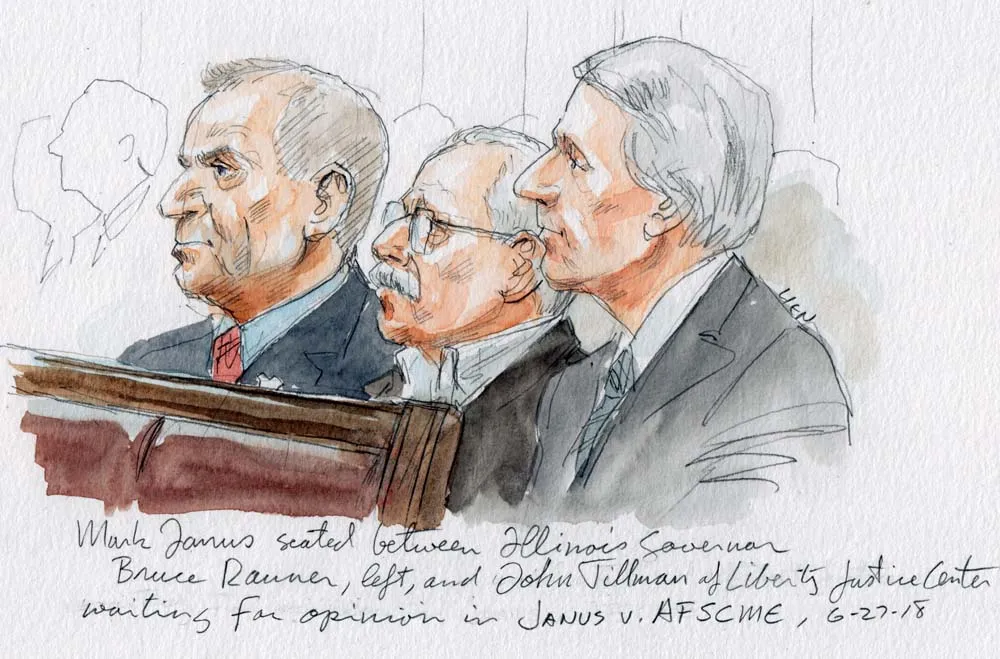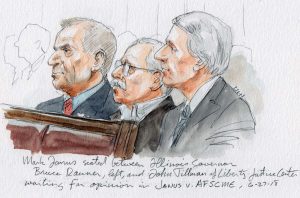A “view” from the courtroom: A river runs through it

on Jun 27, 2018 at 6:41 pm

It’s the last day the justices will take the bench for this term, with just two decisions pending.
When the term ends, the justices will be scattering in short order. Justice Anthony Kennedy is heading to Salzburg, Austria, for his usual teaching stint with the University of the Pacific’s McGeorge School of Law. Check-in at the dorms is this Sunday, and a reception with the justice is scheduled for July 6. Justice Ruth Bader Ginsburg will be the guest lecturer in Rome for the summer law program of Loyola University Chicago, along with her daughter Jane Ginsburg. Justice Neil Gorsuch is heading to Padua, Italy, where he and his former law clerk Jamil Jaffer will teach two courses in national-security law for the Antonin Scalia Law School at George Mason University, the Associated Press reports.

Mark Janus seated between Illinois Governor Rauner, left, and Liberty Justice Center’s John Tillman, waiting for opinion in Janus v. AFSCME
ScotusMap reports that Justice Stephen Breyer will be heading to the Aspen Institute in Colorado for a talk on July 7. Other justices are headed hither and yon.
As we expected, Gov. Bruce Rauner of Illinois and state worker Mark Janus are once again seated in the courtroom, for the third day in a row. But things are looking pretty good that they will get the opinion in Janus v. American, Federation of State, County, and Municipal Employees today.
Meanwhile, one of the lawyers involved in the other pending case, Florida v. Georgia, is here. Greg Garre, a former U.S. solicitor general who represents Florida in this case on the original docket, also takes a seat in the public gallery, not the bar section.
At about 9:55 a.m., Kennedy’s wife, Mary, arrives in the VIP box, accompanied by three young people who seem to be the Kennedys’ grandchildren. At about the same time, in the row of the public gallery closest to the VIP box, the marshal’s office seats a group of spectators including one adult and several smartly dressed children. We don’t know if these are also members of the Kennedy clan, but it seems possible.
There is some stirring in the press section about this. Last year, when there was a similar amount of speculation about a possible retirement by her husband, Mary Kennedy did not attend the last opinion day of the term.
Breyer’s wife, Joanna, is back in the VIP box today, for the third session in a row. There has been virtually zero speculation about a Breyer retirement.
The court takes the bench, and the chief justice quickly announces that Justice Samuel Alito has the opinion in Janus. It does not look like there will be a surprise outcome in that case. Still, Janus the person and Rauner show no reaction that Alito, who has led the effort to overrule 1977’s Abood v. Detroit Board of Education, which authorized public-employee unions to collect agency fees from workers who don’t join the union, has the opinion.
Alito can be quite brief with his opinion announcements, but today he delivers a fairly detailed summary of his 49-page opinion concluding that a state’s extraction of agency fees from nonconsenting public employees violates the First Amendment, and that Abood erred in concluding otherwise, cannot be supported by stare decisis, and is therefore overruled.
Alito says he will address in detail two of the dissent’s defenses of Abood, the “free rider argument” and the “Pickering argument,” from the court’s 1968 employee free speech decision in Pickering v. Board of Education of Township High School District 205, which as it happens, came from Illinois. The court held that a school district violated the First Amendment by firing a teacher who wrote a letter to a newspaper critical of the school administration.
He spends some time on the notion that agency fees keep nonmembers from free-riding on the unions’ collective-bargaining efforts. But he says those like the petitioner in this case “are not trying to get a free ride to a destination they don’t want to go to. They don’t want the free ride at all.”
Alito turns to the Pickering argument and stresses the principle that the job-related speech of public employees does not get much First Amendment protection.
“If an employee says, ‘My boss is an ignoramus,’” that is not going to be protected, Alito says.
He makes the point that union speech in collective bargaining cannot be separated from matters of public debate, pointing to the area of education, and saying speech in this area touches on matters such as merit pay, teacher tenure, and how teacher performance and student progress should be measured.
“Can anyone say these are only matters for teachers and schools?” Alito says. “We don’t think so.”
Alito continues, discussing four factors that he says “weigh heavily” for not giving stare decisis to Abood. By this point, Justice Elena Kagan, who went head-to-head with Alito in the 2014 decision in Harris v. Quinn, is wearing her reading glasses and looking down at papers.
Alito concludes that “for all these reasons, Abood must be overruled.” Justice Sonia Sotomayor has a dissent, he says. Kagan has a dissent, joined by Ginsburg, Breyer and Sotomayor.
And then Kagan, who has rarely dissented from the bench, speaks up, saying that she and the others “respectfully dissent from today’s decision overruling Abood v. Detroit.”
“There’s no sugarcoating today’s opinion,” she says. “The majority overthrows a decision entrenched in both this nation’s law and its economic life.”
Kagan is stern and sometimes angry-sounding as she goes on at some length. Alito, who sits immediately to her left, leans back in his chair and at times seems to be peeking over her shoulder at her statement.
“Today, the court succeeds in its six-year crusade to reverse Abood,” Kagan says, and “today’s decision will have large-scale consequences. Public-employee unions will lose a secure source of financial support.”
She concludes by saying the majority has “chosen the winners” in the policy debate over agency fees “by turning the First Amendment into a sword, and using it against workaday economic and regulatory policy.”
“Speech is everywhere,” she says, and almost all economic or regulatory policy affects speech.
“So the majority’s road runs long. And at every stop are black-robed rulers overriding citizens’ choices.”
When Kagan is finished, Roberts moves quickly to say that Breyer has the opinion “in Number 142 on our original docket, Florida v. Georgia.”
Breyer moves breezily to summarize the ruling in this water dispute that he acknowledges is not a blockbuster.
“This is a technical case,” he says, involving an interstate river basin involving the Flint and Chattahoochee Rivers, which begin near Atlanta, and flow south and meet the Apalachicola River in Florida. Five members of the court, he says, have concluded that the special master in the case applied too strict a standard in ruling against Florida.
The court remands the case to the special master for further proceedings, but not before putting a few dimes in the jukebox.
“If you wish to learn something of the beauty and the emotional appeal of this southeastern river basin, I could recommend songs, say, by Alan Jackson, who has one entitled ‘Chattahoochee.’ Even Bing Crosby and Bob Hope had one called ‘Apalachicola F.L.A.’”
“But if you wish to learn about water rights, equitable apportionment of river water among states, and other related legal and factual circumstances” about the basin, Breyer says, read the opinions, “which we hope, despite their length, hold legal interest.”
Breyer says that Justice Clarence Thomas has filed a “thorough” dissenting opinion, joined by Alito, Kagan and Gorsuch.
With that, the chief justice says he is “authorized to announce that the court has acted upon all cases submitted the court for decision this term.” He discusses the order list that will be released on Thursday morning, and thanks Supreme Court employees and members of the Supreme Court bar.
“Before we rise for the summer, I would like to note the retirement of three court employees,” Roberts continues. This is a tradition, and it does not typically include justices. Nor will it today.
The chief justice recognizes Corporal John Gilliam of the Supreme Court police department, who will retire at the end of the month after 20 years of service, and Cristi Cherry, a paralegal specialist and secretary to the court’s legal counsel, retiring this month after 23 years of Supreme Court service.
“Finally, my administrative assistant, Diane Nelson, has announced she is retiring July 12, with 12 years of Supreme Court service,” Roberts says. “I am personally grateful to Diane for her dedication, hard work, and friendship.”
Roberts wishes all three well in their retirement. Kennedy has taken this all in without betraying any hint of what is to come this afternoon.
Marshal Pamela Talkin bangs her gavel to close out the session, and the justices make their way through the red velvet curtains, one for the last time.


